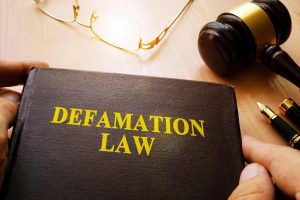Other Personal Injury
Less Common Personal Injury Claims
 Though most personal injury claims involve motor vehicle accidents, premises liability, dangerous or defective products, professional malpractice, or work-related injuries, there are other injuries for which individuals may seek damages:
Though most personal injury claims involve motor vehicle accidents, premises liability, dangerous or defective products, professional malpractice, or work-related injuries, there are other injuries for which individuals may seek damages:
- Defamation involves the communication of a false statement that causes damage to reputation. Traditionally, defamation has been categorized as either libel or slander. Defamation in any form other than spoken words, whether written, printed text, pictures, cartoons, or drawings, constitutes libel. Defamation in the form of spoken words is slander.
Generally, defamation requires “publication.” For slander, this means that the statement must be made to or heard by some person other than the speaker. For libel, publication requires that the false statement be fixed in a tangible medium, i.e., put on paper or in some form where it can be seen by others. To constitute defamation, the false statement must be a statement of fact.
Statements of opinion are never subject to defamation claims. Because defamation requires a false statement of fact, truth is considered an absolute defense to a claim of libel or slander. In addition, several exceptions have been carved out of the rule, including an exception for certain statements about people who are considered “public figures,” and therefore considered to have invited attention and commentary.
- Intentional torts. Most personal injury claims are based on a theory of negligence, an allegation that the defendant acted carelessly, but not intentionally. However, an injured person may also seek compensation for harm resulting from intentional acts.
- Assault and battery. While generally identified as criminal offenses in most jurisdictions, assault and battery can also give rise to a personal injury claim. Typically, an injured person will be able to recover damages by showing that the defendant acted intentionally, that the defendant’s acts caused injury, and that the injured party suffered some sort of loss.
- False imprisonment. A person may seek damages for false imprisonment if he or she is intentionally confined to a limited area without reasonable cause or consent. False imprisonment may involve locking someone in or tying them down, but it may also be accomplished by threats of harm or force.
- Intentional infliction of emotional distress. A person may seek compensation for intentional infliction of emotional distress by showing that:
- someone else acted intentionally or recklessly;
- the conduct was extreme and outrageous;
- the conduct caused emotional distress; and
- the distress was severe.
Connect with Top-rated Attorneys Near You
Other Personal Injury Law Center Topics
Damages
Your Rights When You Have Been Injured by a Dangerous or Defective Product
Adderall and Ritalin
Protecting Your Legal Rights After a Car Accident
Your Rights After a Construction Accident
Defective Drug Claims
Defective Drugs and Medical Devices Law Center
Dog Bites
Fosamax
Hormone Replacement Therapy
Ketek
Kugel Mesh Patch
Recovering Compensation After Medical Malpractice
Medtronic Defibrillators
Medtronic Pacemakers
Understanding Negligence in a Personal Injury Claim
Neurontin
Nursing Home Neglect and Abuse
Ortho Evra
Other Professional Malpractice
Your Rights in a Premises Liability Claim
Prempro
Seroquel
Sulzer Hip Implants
Toxic Tort
Trucking Accidents
Wrongful Death
Zyprexa
Defective Drugs & Medical Devices
Latest Article
Joint Custody vs. Sole Custody: What Courts Prefer Today
Custody decisions are not about rewarding or punishing parents. Courts focus on one question: what arrangement best supp... Read More
Parenting Plans: What Must Be Included for Court Approval
Courts don’t approve parenting plans because they look fair to parents. They approve them because the plan clearly pro... Read More
Employee Misclassification: Independent Contractor vs. Employee
How a worker is classified matters more than many people realize. Being labeled an independent contractor instead of an ... Read More
GETLEGAL®ATTORNEY DIRECTORY
Find Leading Attorneys in Your Area
NEED PROFESSIONAL HELP?
Talk to an Attorney
How It Works
- Briefly tell us about your case
- Provide your contact information
- Choose attorneys to contact you


